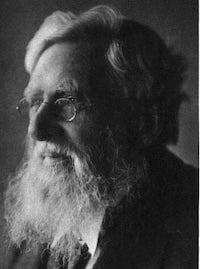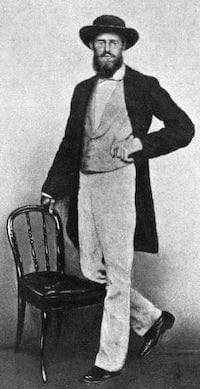Crazy Bug Hunter 003
Alfred Russel Wallace (1823-1913)
Alfred Russel Wallace did not knowingly study infectious diseases or their microbial causes, but he did travel extensively and repeatedly put himself in the biological line of fire, as evidenced in his many writings.
In this year of Darwin anniversary celebrations, the name Alfred Russel Wallace has surfaced frequently. He was the co-author with Charles Darwin of the first scientific paper on natural selection (Linnean Society, 1st July, 1858), though in subsequent years Darwin’s reputation overshadowed Wallace’s. The evidence supports the view that Alfred Russel Wallace came to his conclusions independently from Darwin as a result of his travel in the Amazon basin and subsequently in Southeast Asia, where he sought evidence in support of the emerging theory of transmutation of species.
Wallace’s expedition to northern Brazil clearly shaped his thinking on the origins of species diversity but he was dogged by troubles including the loss of his younger brother, Herbert, to yellow fever and the eventual loss of almost all his specimens and most of his notebooks in a fire on the ship that carried him home to the UK. He later survived encounters with a variety of wild beasts as recounted in books such as his ’Malay Archipelago’. Between 1854 and 1862 he collected over 125,000 specimens and laid the foundations for the field of biogeography by identifying key geographic boundaries to species distribution. One of those key boundaries was subsequently named after him (the Wallace line) in recognition of his work. While he was busy studying the biodiversity of the Malay archipelago he read the work of Thomas Malthus and was inspired to describe the process of species diversification. In his autobiography he describes the process as the result of lying in bed with a fever. Further evidence that he put himself in the line of fire for the sake of biological science.
Though Wallace’s thoughts on natural selection converged with those of Darwin in 1858, there were key differences and a later divergence in their respective opinions. Darwin and Wallace retained considerable respect for each other for the rest of their lives but that did not prevent them choosing to differ on key points of the scientific debate on the origin of species. While Darwin emphasised competition, Wallace placed more weight on the role of the environment as a driver of species diversity. Despite these differences of opinion, Wallace was one of the foremost proponents of natural selection and wrote a book entitled ‘Darwinism’ in its defence.
So what of the germs? Wallace was an early adopter of radical ideas including aspects of social reform, having been influenced by the work of Robert Owen. He was also quite anti-authoritarian and opposed mandatory smallpox vaccination, highlighting the inadequacies of evidence brought out in favour of vaccine use. While this view may seem quaint today, it reflects Wallace’s ability to pursue an unpopular opinion while seeking better evidence to form his own opinion.
And in this year of Darwin anniversaries, with the announcement of a series of new species to be named in Darwin’s honour, there is still a place for Alfred Russel Wallace. Only this week there was a preliminary announcement of the separation of a pathogenic bacterial species into two distinct groups that separate on either side of the Wallace line. He could not have anticipated the impact molecular genetics would have on bacteriology, but his ideas still carry considerable weight.
References
- Alfred Russel Wallace
- Alfred Russel Wallace. Letters and Reminiscences. 1916
- Alfred Russel Wallace. My Life [Volume II]. 1905
- Alfred Russel Wallace. Island Life. 1880
- Raby P. Alfred Russell Wallace; A Life. Pimlico, Random House, London, 2001
- Pearson T et al. Phylogeographic reconstruction of a bacterial species with high levels of lateral gene transfer. BMC Biol. 2009; 7: 78.

eponymictionary
the names behind the name


